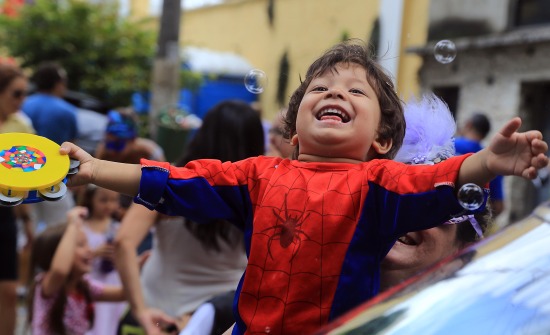Valeu, Carnaval.
 Monday, February 16, 2015 at 10:07AM
Monday, February 16, 2015 at 10:07AM  So this is our last carnaval in Brazil, and I suppose that's made me think about it a bit more than usual.
So this is our last carnaval in Brazil, and I suppose that's made me think about it a bit more than usual.
As the parents of young children, carnaval is pretty much a voyeuristic experience for us, one that we observe from the sidelines.
During the afternoons, we pass everyone heading out in their fancy dress, at night we listen to the howls of the damned, and in the morning we venture out into the aftermath, picking our way through the broken glass while everyone sleeps off their debauch.
Often I catch myself putting on my thinnest smile as we pass the revellers going, at least metaphorically, in the opposite direction.
But in my better moments, I’m philosophical enough to realise that my peevishness is not really about the festival. I'm actually reacting to a whole bunch of stuff that has very little to do with the holiday – my relative inability to participate, the sleazy sexism with which commercial forces are attempting to commodify this least corporate of festivals (see video below), the way my gringo compatriots willingly traduce the occasion into yet another orgy of hedonism. (N.B. The following video is the TV spot advertising this year's carnaval on Brazil's largest network, Globo. Unreconstituted exploitation at its very best...also, my eyes!)
The big problem behind all this is that carnaval is one of those experiences that doesn't translate easily or well outside that loosely defined bundle of memories, behaviours and aesthetic preferences which we call a national identity.
This was powerfully brought home to me during last year's carnaval when I attended a mini ‘bloco’ (block party) for my kids' daycare. We led the kids out in their own mini-parade, a boisterous cortege of pirates, princesses, super-heroes, fierce animals, country bumpkins and fairies encircled by a loop of ribbon. There was music on a handheld stereo and all the grown-ups were dressed up and, as we walked along, every single adult was belting out the words to every single song.
That's what made me realise how special carnaval is. Yes, it's an excuse to get drunk and bawdy. But it's also a chance to remember the songs of your childhood and dress up and show pride in your community, a defiantly secular and non-corporate celebration that connects you in one rain-soaked moment with the whole vast and loosely affiliated collective of your nation.
I saw another example of the special atmosphere that carnaval produces last weekend. We were having a snack in a local bar when we got caught up in one of the many warm-up blocos that pass up and down the streets of every neighbourhood before the real celebrations start. There was a truck with speakers on it and a band of very hipsterish twenty-something kids playing the old songs to a rapturous throng. Everyone was drunk and dressed up, covered in face paint, spraying foam, pulling streamers. There were little carts on the fringes selling shots of cachaça and vodka, kids riding on their parents' shoulders, not a single policeman in sight, and yet the whole thing was completely peaceful.
As the crowd thinned out, my eye was caught by an old woman whom I'd noticed before, watching the parade approach from her doorway. When the crowds got too much for her, she retreated upstairs to watch from her window. Now a young guy in the crowd noticed her, and was shouting something up which I couldn't hear. The old lady wagged her finger in the negative. He tried again. Eventually they entered into a teasing, flirtatious kind of dialogue that must have lasted five minutes amid all that crowd, with people laughing and looking on, as he tried to charm her down from her window and she rebuffed his advances to the delight of everyone watching.
I think that, not booze, is the real carnaval spirit: the urge to try and get everyone involved in the party irrespective of age or any other factor, and completely without malice.
I think every holiday ever invented has moments like that one. It's just that you have to peek through the cracks to find them.

Reader Comments